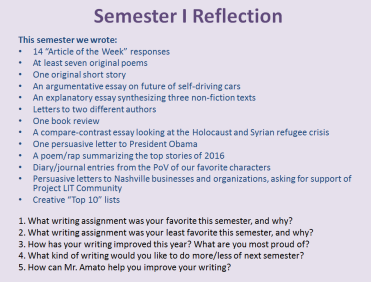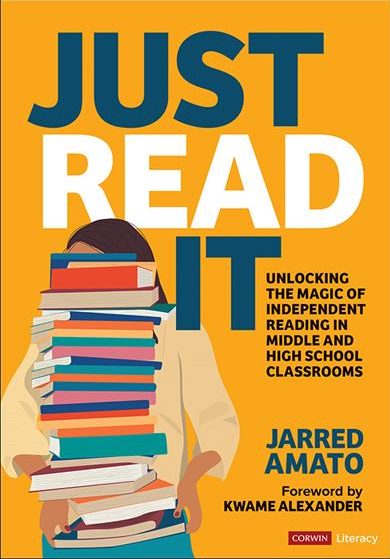 At the end of each semester, my students organize their writing into a portfolio in Google Classroom. The portfolio includes a table of contents page, all of their major writing assignments, and most importantly – a self-reflection.
At the end of each semester, my students organize their writing into a portfolio in Google Classroom. The portfolio includes a table of contents page, all of their major writing assignments, and most importantly – a self-reflection.
After reviewing all of their writing from the semester, students answered the following questions:
- How did your writing improve this semester?
- What writing assignment was your favorite this semester, and why?
- What writing assignment was your least favorite this semester, and why?
- What kind of writing would you like to do more/less of next semester?
- How can Mr. Amato help you improve your writing?
Here’s what I learned:
- Students love to argue. Shocker, I know. But, as teachers, why not capitalize on that?! Nearly all students said they enjoyed arguing for or against the use of self-driving cars. As one sophomore wrote, “I loved the topic and being able to give my opinion about what’s going to happen in the future.” Another added, “I feel like argumentative essays bring out the best in my writing.” You can bet that we’re going to continue reading, writing, and discussing relevant, controversial texts next semester.
- Students crave – and deserve – choice. Their favorite assignment from the semester, even more than the argumentative essay, was the original short story. Why? “Because we got to completely make up our own story with our own characters and events,” wrote one student. “I enjoy writing about topics of my own rather being told what to write,” reflected another. I couldn’t have said it better myself. Choice + support = engagement.
- To that end, we need to trust students. Confession: I almost didn’t assign the short story because of how open-ended it was (I gave my students some general requirements, but for the most part, left it entirely up to them). I was afraid that my students would get stuck, that they would need more structure or direction, that they would “fail.” I’m so glad that I overcame my own fears and desire for control and empowered my students to use their imagination. As one student wrote, “My favorite assignment this semester was the short story because it gave me a chance to be creative…It was the first story I ever wrote so it’s special to me and I’m really proud of my story.” And to think that I almost didn’t give her that opportunity…
- Reading and writing go hand-in-hand. While this is a no-brainer for most English teachers, I loved that students made the connection between reading & writing in their reflections. In fact, one wise student wrote that “reading really helped me change the way I write.” YES, yes it did!
- Creative writing such as poetry and short stories has tremendous social/emotional value. A number of students asked for more time to read and write poems, while others enjoyed writing stories based on their own lives. As one student said, “I put my life into a story and writing it took some relief off my shoulders.” I firmly believe that an English classroom should be a safe, therapeutic place for students – where reading and writing are tools to help them through this crazy thing we call life.
- Volume matters. It wasn’t one particular essay that helped my students improve dramatically from August to December – it was the fact that we were always writing. As one student put it, “The more we wrote, the more my writing flowed.”
- Students appreciated outlines and graphic organizers. Writing is not about meeting a certain word count or number of paragraphs. It’s about being to organize your thoughts in a clear, logical manner. To that end, several students said they enjoyed having different outlines, depending on the task and purpose, to help them “sort out my thoughts before actually writing.”
- Authentic audiences matter. A number of students said they enjoyed writing letters to the authors of books they read this semester. Why? “Because I could tell them how I felt about their books,” wrote one student. “I enjoyed praising his book,” said another. Main takeaway: students need opportunities to write for real audiences – not just their teacher.
- Targeted grammar instruction that students can apply to their writing is still important. For example, one student wrote, “Learning subject-verb agreement gave me a leg up and it’s still improving by the minute,” while another added, “At first I only knew how to use commas, but now I know how to use semi-colons, too.” I spent 10-20 minutes per week on a few important skills – commas, semi-colons, subject-verb agreement, combining sentences, fragments/run-ons, etc. – and based on student feedback, will continue with a similar approach next semester.
- Their reflections will shape the writing we do next semester. You can bet that I’m going to take their suggestions into account as I sit down and plan over winter break. Here’s what my students said they’d like even more of next semester:
- Creative writing, especially short stories
- Poetry to read and write about
- Writing that I can put my imagination into
- Writing about things that I’m interested in
- Essays on current events and problems in the world
- New technology debates
- Controversial topics and argumentative essays
- ACT grammar practice
I can’t wait to get started!
